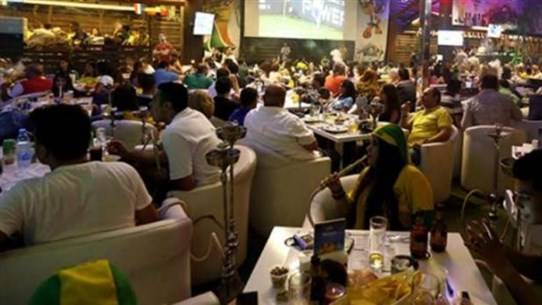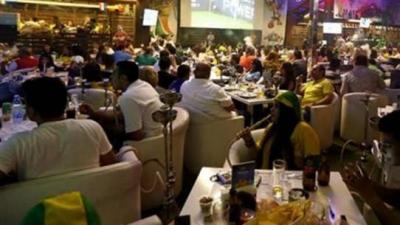On the eve of the kickoff of the global football festival in Qatar, Lebanese citizens are caught between the hope of watching World Cup matches and the fear of being deprived of participating, even remotely, in a carnival where football becomes the world's focus every four years. As the countdown to the Qatar 2022 World Cup continues, one question remains pressing: Will the official Lebanese television be granted the rights to broadcast the World Cup games, allowing the people of "the land of the cedars" to watch them for free, or will the citizens of the beleaguered country either be "excluded" from the World Cup activities due to the overwhelming collapse or be forced to bear the burden of paying hefty amounts in fresh dollars for subscriptions?
Even by Saturday evening, just before the World Cup kicks off, the situation was unresolved, and the fate of the broadcasts remained uncertain. The usual preparations that typically fill the streets of the capital, Beirut, and other Lebanese regions during every World Cup, such as selling flags, jerseys, horns, and more celebration items, appeared very subdued. Minister of Information in the caretaker government, Ziad Makari, has yet to provide a definitive promise to the Lebanese that the negotiations to secure a "free passage" for broadcasting the World Cup have succeeded. As the saying goes, "the eye is seeing, but the hand is short," and negotiations with the broadcasting company were still ongoing regarding the amount Lebanon could pay to secure broadcasting rights through the official television channel.
There is no doubt that the required amount exceeds the capabilities of a country drowning in financial crises, which is struggling to secure basic necessities, let alone entertainment. Minister Makari confirmed in a press interview that "there is more than one source for funding, and a number and method for payment have been reached," but negotiations have not yet led to a complete agreement despite some progress. Insiders indicate that the requested amount reached 6 million dollars and was reduced to 4.5 million through negotiations, but even this amount is beyond the capacity of the official entities to pay. They also affirmed that Lebanese television is neither technically nor humanly prepared to cover this global event as it has done in previous World Cup editions.
The crisis of broadcasting the World Cup matches is not a new development; it occurred in 2014 and was repeated in 2018, when the Lebanese state had to negotiate with the Qatari state and ask for assistance and mediation to allow the Lebanese people to watch the matches for free on their local television. However, it seems that matters are more complicated this time, especially with the high costs for Qatar to host such a large global event on its territory.
**Cold Atmosphere**
As a result of this setback, the atmosphere remains cold on the streets, despite the Lebanese being among the most passionate football fans, eagerly supporting their teams and dividing over them just as they do with their political parties and leaders. Some have "brushed off the dust" from old flags and set them up on buildings, but the excitement has not reached the level of "hysteria" as it has in the past. Even purchasing a large flag has become a burdensome expense that requires careful consideration.
However, Lebanese who are accustomed to finding solutions for all obstacles will undoubtedly find ways to watch the World Cup matches—some legal, others illegal. Those able to pay in dollars rushed to subscribe, with costs ranging between $80 and $400 through legitimate cable companies. Some opted to purchase specific receivers to capture the broadcasts via local cable distributors, while others would resort to watching matches on Turkish or Cypriot channels or any channels their satellite dishes could pick up, even at the expense of commentary language or broadcast quality. However, these means remain contingent upon securing electricity from either the "state" or private generators and ensuring that the power does not cut off during the broadcast times, which are poorly aligned with the private generator schedules.
Tech-savvy individuals will follow the matches through live streaming on various internet applications via their smartphones or smart TVs, requiring fast, uninterrupted internet—a reliability that cannot be guaranteed in Lebanon. The easiest yet most expensive method to watch the matches will be at cafes and restaurants, the majority of which hurried to subscribe to beIN, hoping to provide viewing services for the Lebanese while also generating additional income that these establishments sorely need.
**An Economic Opportunity for Many**
Khaled Nazha, the deputy head of the restaurant and cafe owners' syndicate, explained to "Al-Rai" the costs incurred by tourism institutions to secure the broadcast of the matches and how this will reflect on them and their patrons. "It is the biggest sporting event that the Lebanese await, and it carries a special flavor in this country, spreading enthusiasm and joy. But with the negotiation challenges faced by the Minister of Information, tourism institutions have prepared themselves to accompany the event despite high costs regarding preparations and purchasing large screens or paying subscriptions to beIN that reached around $3,000 for small establishments and up to $15,000 for larger ones, not to mention fuel costs to ensure continuous electricity."
As a result, institutions have imposed an additional charge on the bill or instituted a minimum spending requirement that customers cannot go below. What customers are expected to pay each time is uncertain and varies from one establishment to another, but according to what we were informed, it should range between $5 and $20 per person per match. This method seems fair to the tourism institutions looking for ways to survive after experiencing daunting crises in previous years. It is also a way to inject joy and usher the country early into the festive moods of the year-end holidays, especially since the holiday season is expected to be bustling with many tourists.
"Many Lebanese are unable to purchase a screen or secure subscription costs," says Nazha. "The majority also cannot afford the gas costs to reach a place broadcasting the matches. There is no doubt that patrons cannot bear the daily costs to watch all the matches, but despite this, I expect the World Cup season to be quite good, especially as the country has become 'internationalized,' and there are groups capable of visiting restaurants and cafes more frequently. The World Cup and the subsequent holidays will create an acceptable commercial and tourist activity."
The Ministry of Tourism announced in a statement on Saturday that "with the kickoff of the 2022 FIFA World Cup matches, and given that tourism institutions wishing to broadcast the matches incur a financial cost, each according to its capacity, the Ministry of Tourism permits tourism establishments broadcasting the World Cup matches to charge an entry fee per person or set the required price for each person according to what the establishment offers during the match broadcast, after submitting a copy of the price list in both Arabic and English to the Ministry of Tourism for approval, along with the timing of the programs to be shown."
The Ministry also stressed its regulatory role according to the applicable rules and requested that all establishments "clearly announce their price lists at their entrances, preserving transparency between tourism institutions and their patrons." Some municipalities and clubs in villages and regions have joined tourism institutions to provide residents the opportunity to watch the matches on large screens. Although this experience could have been widely replicated, it remains limited to a few municipalities.
However, despite these efforts, tourism institutions alone cannot carry the burden. The streets of Beirut and other regions lack nighttime lighting, and some patrons hope to return home before power outages and elevator stoppages occur. Additionally, the necessary security presence for gatherings at cafes and squares must be ensured to prevent any violent incidents, especially since security forces are financially and humanly strained and must distribute their presence across many locations. Above all, the Lebanese people await a political truce in which factions cease their daily bickering to create an atmosphere of stability that allows the citizens of this beleaguered country to enjoy a sporting event they have long waited for every four years.
**Lebanese Earning Livelihoods from the World Cup**
The World Cup phenomenon in Lebanon is not limited to watching the games; it also extends to a large number of young Lebanese who found in this event a source of income, allowing them to return to Lebanon with some dollars to help face the upcoming crises in their country. Hundreds of young Lebanese headed to Qatar to assist with organizing the grand event. Some went as senior staff members, while the majority worked as workers and helpers at the stadiums.
While some who earned salaries exceeding $3,000 managed to secure decent accommodations, many whose salaries did not exceed $1,000 were forced to live either in large groups in one accommodation or in very small rooms, which some described as resembling metal containers. Nevertheless, despite the hardships, the Lebanese are grateful for this opportunity. The Lebanese Ministry of Labor, in cooperation with the Qatari government, has established a special website for job openings in Qatar to encourage Lebanese to apply for these positions and assist them in submitting their applications online.




